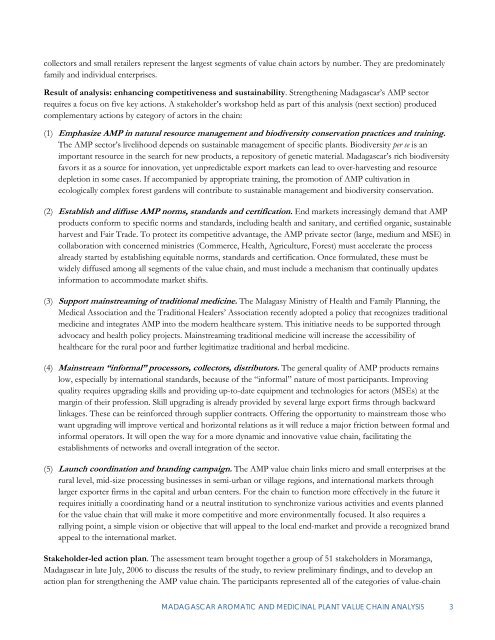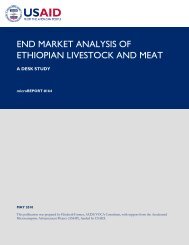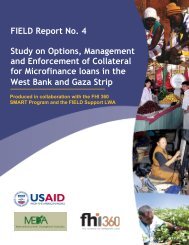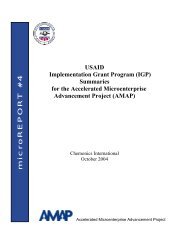Madagascar Aromatic and Medicinal Plants Value - Microlinks
Madagascar Aromatic and Medicinal Plants Value - Microlinks
Madagascar Aromatic and Medicinal Plants Value - Microlinks
Create successful ePaper yourself
Turn your PDF publications into a flip-book with our unique Google optimized e-Paper software.
collectors <strong>and</strong> small retailers represent the largest segments of value chain actors by number. They are predominately<br />
family <strong>and</strong> individual enterprises.<br />
Result of analysis: enhancing competitiveness <strong>and</strong> sustainability. Strengthening <strong>Madagascar</strong>’s AMP sector<br />
requires a focus on five key actions. A stakeholder’s workshop held as part of this analysis (next section) produced<br />
complementary actions by category of actors in the chain:<br />
(1) Emphasize AMP in natural resource management <strong>and</strong> biodiversity conservation practices <strong>and</strong> training.<br />
The AMP sector’s livelihood depends on sustainable management of specific plants. Biodiversity per se is an<br />
important resource in the search for new products, a repository of genetic material. <strong>Madagascar</strong>’s rich biodiversity<br />
favors it as a source for innovation, yet unpredictable export markets can lead to over-harvesting <strong>and</strong> resource<br />
depletion in some cases. If accompanied by appropriate training, the promotion of AMP cultivation in<br />
ecologically complex forest gardens will contribute to sustainable management <strong>and</strong> biodiversity conservation.<br />
(2) Establish <strong>and</strong> diffuse AMP norms, st<strong>and</strong>ards <strong>and</strong> certification. End markets increasingly dem<strong>and</strong> that AMP<br />
products conform to specific norms <strong>and</strong> st<strong>and</strong>ards, including health <strong>and</strong> sanitary, <strong>and</strong> certified organic, sustainable<br />
harvest <strong>and</strong> Fair Trade. To protect its competitive advantage, the AMP private sector (large, medium <strong>and</strong> MSE) in<br />
collaboration with concerned ministries (Commerce, Health, Agriculture, Forest) must accelerate the process<br />
already started by establishing equitable norms, st<strong>and</strong>ards <strong>and</strong> certification. Once formulated, these must be<br />
widely diffused among all segments of the value chain, <strong>and</strong> must include a mechanism that continually updates<br />
information to accommodate market shifts.<br />
(3) Support mainstreaming of traditional medicine. The Malagasy Ministry of Health <strong>and</strong> Family Planning, the<br />
Medical Association <strong>and</strong> the Traditional Healers’ Association recently adopted a policy that recognizes traditional<br />
medicine <strong>and</strong> integrates AMP into the modern healthcare system. This initiative needs to be supported through<br />
advocacy <strong>and</strong> health policy projects. Mainstreaming traditional medicine will increase the accessibility of<br />
healthcare for the rural poor <strong>and</strong> further legitimatize traditional <strong>and</strong> herbal medicine.<br />
(4) Mainstream “informal” processors, collectors, distributors. The general quality of AMP products remains<br />
low, especially by international st<strong>and</strong>ards, because of the “informal” nature of most participants. Improving<br />
quality requires upgrading skills <strong>and</strong> providing up-to-date equipment <strong>and</strong> technologies for actors (MSEs) at the<br />
margin of their profession. Skill upgrading is already provided by several large export firms through backward<br />
linkages. These can be reinforced through supplier contracts. Offering the opportunity to mainstream those who<br />
want upgrading will improve vertical <strong>and</strong> horizontal relations as it will reduce a major friction between formal <strong>and</strong><br />
informal operators. It will open the way for a more dynamic <strong>and</strong> innovative value chain, facilitating the<br />
establishments of networks <strong>and</strong> overall integration of the sector.<br />
(5) Launch coordination <strong>and</strong> br<strong>and</strong>ing campaign. The AMP value chain links micro <strong>and</strong> small enterprises at the<br />
rural level, mid-size processing businesses in semi-urban or village regions, <strong>and</strong> international markets through<br />
larger exporter firms in the capital <strong>and</strong> urban centers. For the chain to function more effectively in the future it<br />
requires initially a coordinating h<strong>and</strong> or a neutral institution to synchronize various activities <strong>and</strong> events planned<br />
for the value chain that will make it more competitive <strong>and</strong> more environmentally focused. It also requires a<br />
rallying point, a simple vision or objective that will appeal to the local end-market <strong>and</strong> provide a recognized br<strong>and</strong><br />
appeal to the international market.<br />
Stakeholder-led action plan. The assessment team brought together a group of 51 stakeholders in Moramanga,<br />
<strong>Madagascar</strong> in late July, 2006 to discuss the results of the study, to review preliminary findings, <strong>and</strong> to develop an<br />
action plan for strengthening the AMP value chain. The participants represented all of the categories of value-chain<br />
MADAGASCAR AROMATIC AND MEDICINAL PLANT VALUE CHAIN ANALYSIS 3





